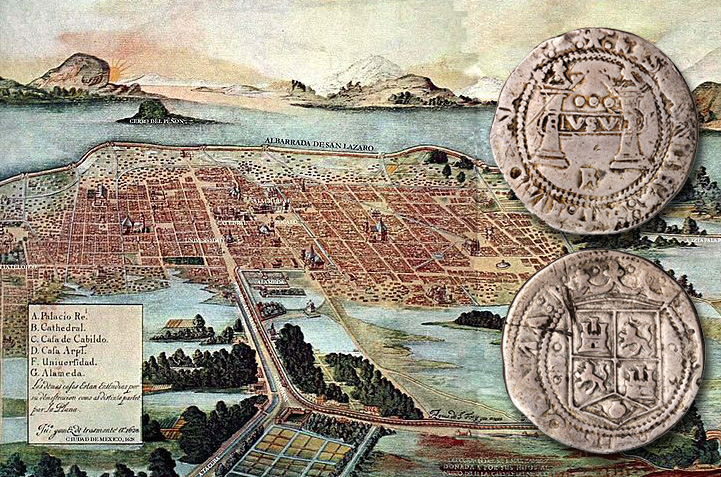
Now under the Habsburg dominion were the Spanish conquests in the New World. Recently conquered by Hernan Cortes, the former Aztec capital of Tenochtitlan became Mexico City, the capital for New Spain and the minting location for these issues. Carlos issued a formal decree to establish a mint in Mexico City in 1535 and after the mint officials arrived from Spain (several months later) the minting began in early 1536. The first few years of coinage are known as the “Early Series” and are most easily identified by their lack of water lines. The Assayer Francisco del Rincon held the office for two years (at the time it was only on a two year lease) and used the assayer mark “R”. The three Reales pieces were only issued for approximately one and a half years, as in 1537 a decree was issued for their production to cease, and authorizing four and eight Reales to begin production. This seldom seen denomination was struck on a rather large planchet and is often confused with the four Reales, as they are similar in design and size.
The obverse design for this coin (and the series) depicts the famous “Pillars of Hercules” which marked the Strait of Gibraltar separating the Atlantic Ocean and the Mediterranean Sea. According to Greek mythology these served as a barrier to the outer then unknown sea, and were inscribed “Non plus ultra” or “nothing further beyond.” These Pillars were then adopted by Carlos I as the supporters for his coat of arms, but with a modified motto of “Plus Ultra” or “further beyond.” This was encouragement to go past the defined borders of the world, and to establish the gateway to a new Spanish controlled empire beyond the Pillars. The actual design on this coin shows two pillars surmounted by crowns in the center of the coin, with a bordered banner stretching across, with “PLVSVI” in the banner (which is one form of shorthand for the motto). Three dots above the banner represent the three Reales denomination. In the center field below the pillars is the assayer’s mark “R”. The entire central design is bordered by a beaded circle, with the outer legend “: HISPANIO : ET : INDIARUM :” with a clover symbol at the top just beyond. The obverse legend is not entirely visible; the above represents the complete and unabbreviated legend which states the Spanish holdings and conquests.
The reverse design shows the arms of the joint Castile and Leon, quartered, with a pomegranate below, all surmounted by a crown. “o-M-o” appears at either side of the device, signifying the minting location of Mexico City. A border of dots separates the design and outer legend, with the intended legend reading: “KAROLVS : ET : JOHANA :”. Similar to the obverse, portions of the legend are either worn or slightly off the planchet. Several scratches are present, but otherwise this is a wholesome example of a rare and seldom offered coin. This particular coin is pedigreed to the Hispanic Society of America Collection, and the Huntington Collection.
Look for this and other World numismatic rarities in our upcoming November Baltimore Sale. Preview this impressive coin along with the rest of our auction this October at the Stack’s Bowers and Ponterio office located in Irvine, California. For details please refer to the Auction Schedule/Details link under Current Auctions at www.StacksBowers.com. To schedule an appointment, please call 800.566.2580. While our Stack’s Bowers and Ponterio November Baltimore sale is closed for further consignments, we are currently taking consignments of world and ancient coins for our January New York International, and April 2014 Hong Kong sales. If you are interested in consigning your coins and paper currency (whether a whole collection or a single rarity) be sure to contact one of our consignment directors.





